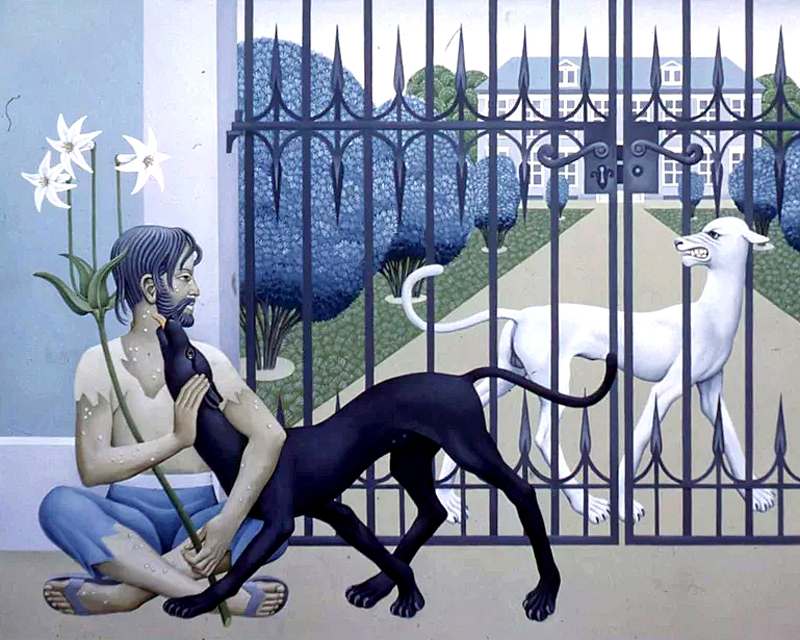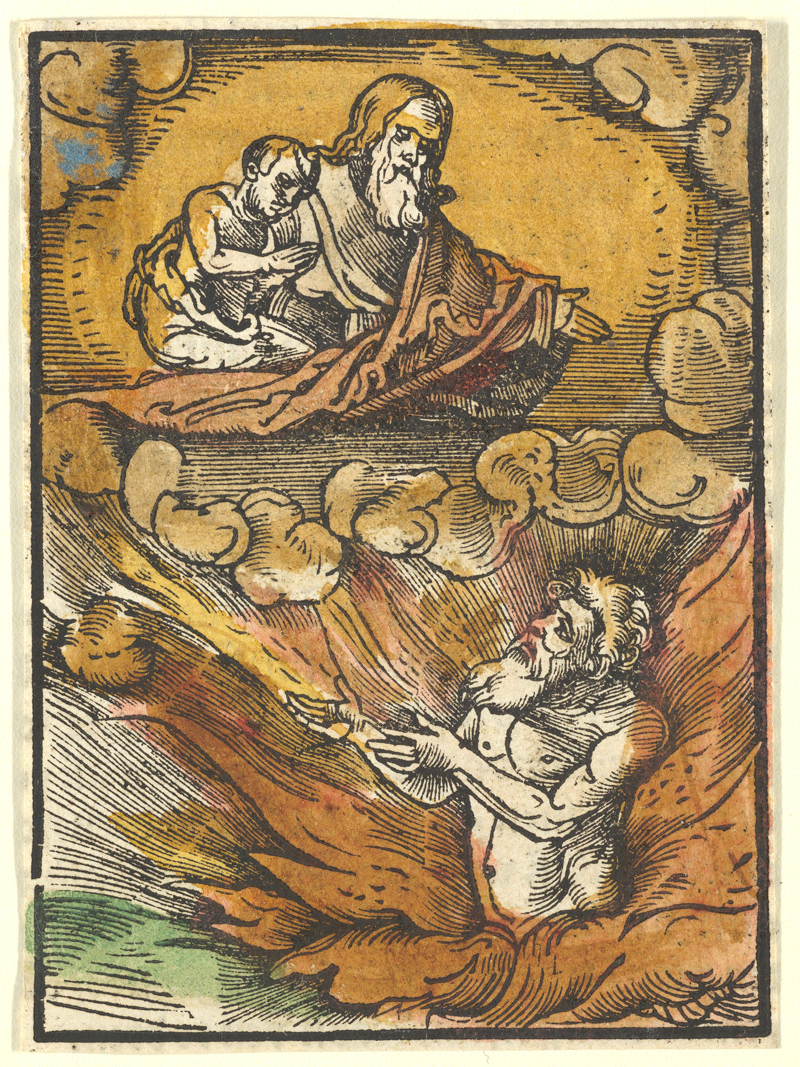
Lazarus at the Gate
Peter Koenig, 20th century

Rich Man in Hell and the Poor Lazarus in Abraham's Lap
Hans Schäufelein, 1517
My dear friends,
The parable of the rich man and Lazarus stands as a profound teaching on the consequences of heedless wealth and spiritual neglect. When read alongside the exhortation in Paul's letter to Timothy, we may hear echoes of the Bodhisattva path, which invites us to cultivate compassion and non-attachment, to see clearly the suffering of others, and to dedicate our lives to their liberation.
who was dressed in purple and fine linen
and who feasted sumptuously every day.
And at his gate lay a poor man named Lazarus,
covered with sores,
who longed to satisfy his hunger
with what fell from the rich man's table;
even the dogs would come and lick his sores.
- Luke 16:19-21
The rich man lives in self-indulgent delusion, clinging to pleasure and status while remaining blind to the suffering at his own gate. The Bodhisattva path, by contrast, calls us to open our eyes to dukkha (anguish) wherever it arises. Lazarus, lying in his misery, is a manifestation of the First Noble Truth: suffering exists. To ignore him is to refuse the Bodhisattva’s vow to liberate all beings.
The rich man also died and was buried.
- Luke 16:22
Both men pass beyond this life, but only one enters into peace. This echoes the Buddhist teaching that the effects of karma outlive us. It is not wealth that condemns the rich man, but his failure to act with compassion (karuṇā). The Bodhisattva, even in death, aspires not to rest in peace alone, but to return until all sentient beings are freed from suffering.
he lifted up his eyes and saw Abraham far away with Lazarus by his side.
He called out, 'Father Abraham, have mercy on me,
and send Lazarus to dip the tip of his finger in water and cool my tongue,
for I am in agony in these flames.'
But Abraham said,
'Child, remember that during your lifetime you received your good things
and Lazarus in like manner evil things,
but now he is comforted here, and you are in agony.
- Luke 16:23-25
In his torment, the rich man experiences the ripening of his karma. His plea for relief shows that suffering, when fully known, can become the first step toward awakening. Yet even now, he views Lazarus as a servant, not as a fellow being. The Bodhisattva sees no hierarchy of worth but bows before all beings as potential Buddhas, especially those who suffer.
so that those who might want to pass from here to you cannot do so,
and no one can cross from there to us.'
- Luke 16:26
The chasm is not created by divine wrath but by the habitual attachments and aversions that have solidified into a barrier. In the Bodhisattva view, the chasm is also internal: the self clinging to ego, status, and comfort cannot reach the mind of equanimity and wisdom. Liberation requires that we recognize and dissolve these separations while still in this life.
-- for I have five brothers -- that he may warn them,
so that they will not also come into this place of torment.'
Abraham replied, 'They have Moses and the prophets; they should listen to them.'
- Luke 16:27-29
Here the rich man shows a flicker of altruistic concern. Yet, the Dharma (spiritual teachings) have always been present—the teachings of Moses and the prophets, like the Buddha's Four Noble Truths, are ever available. The Bodhisattva path reminds us that awakening is possible now, in this very body and mind, through mindful action and compassion, not through miraculous signs alone.
"He said to him, 'If they do not listen to Moses and the prophets,
neither will they be convinced even if someone rises from the dead.'"
- Luke 16:30-31
This verse is a koan: even the greatest miracle cannot awaken those whose hearts are closed. The Bodhisattva does not wait for others to change but continues the path of skillful means, offering Dharma through everyday acts of kindness and clarity. Like Avalokiteśvara, the symbolic manifestation of compassion, the Bodhisattva listens deeply to the cries of the world and responds without expectation.
command them not to be haughty or to set their hopes on the uncertainty of riches
but rather on God, who richly provides us with everything for our enjoyment.
They are to do good, to be rich in good works, generous, and ready to share,
thus storing up for themselves the treasure of a good foundation for the future,
so that they may take hold of the life that really is life.
- 1 Timothy 6:17-19
Paul’s words align with the Bodhisattva ethic: wealth is not inherently wrong, but it must be used in the service of others. Generosity (dāna) is the first of the Six Perfections (paramitas). To be “rich in good works” is to recognize interdependence and to respond to the world’s suffering not with accumulation of goods or merit, but with compassionate action that reveals the true life beyond ego.
May we hear in this parable not a tale of condemnation, but a Dharma teaching. May we, like true Bodhisattvas, turn our gaze toward Lazarus at the gate and respond with the heart of compassion. May we take hold of the life that truly is life—one lived for the benefit of all beings.